Case Study Analysis: Diagnosing and Treating Roberta's Issues
VerifiedAdded on 2021/09/16
|5
|1092
|120
Case Study
AI Summary
This case study analyzes Roberta's mental health issues, primarily focusing on depression stemming from a complex history involving physical abuse, erratic behavior, and social difficulties. The analysis prioritizes key issues, explores diagnostic impressions, and recommends treatment strategies. Roberta's potential diagnoses include bipolar disorder and social anxiety disorder, with symptoms like erratic behavior, suicidal thoughts, and social challenges. Treatment recommendations include support systems, education on managing symptoms, medication, substance abuse therapy, and guidance and counseling. The study emphasizes the importance of a holistic approach to address Roberta's complex needs, highlighting the interconnectedness of her various challenges and the need for a multifaceted treatment plan. The document references supporting literature to strengthen the analysis and recommendations.
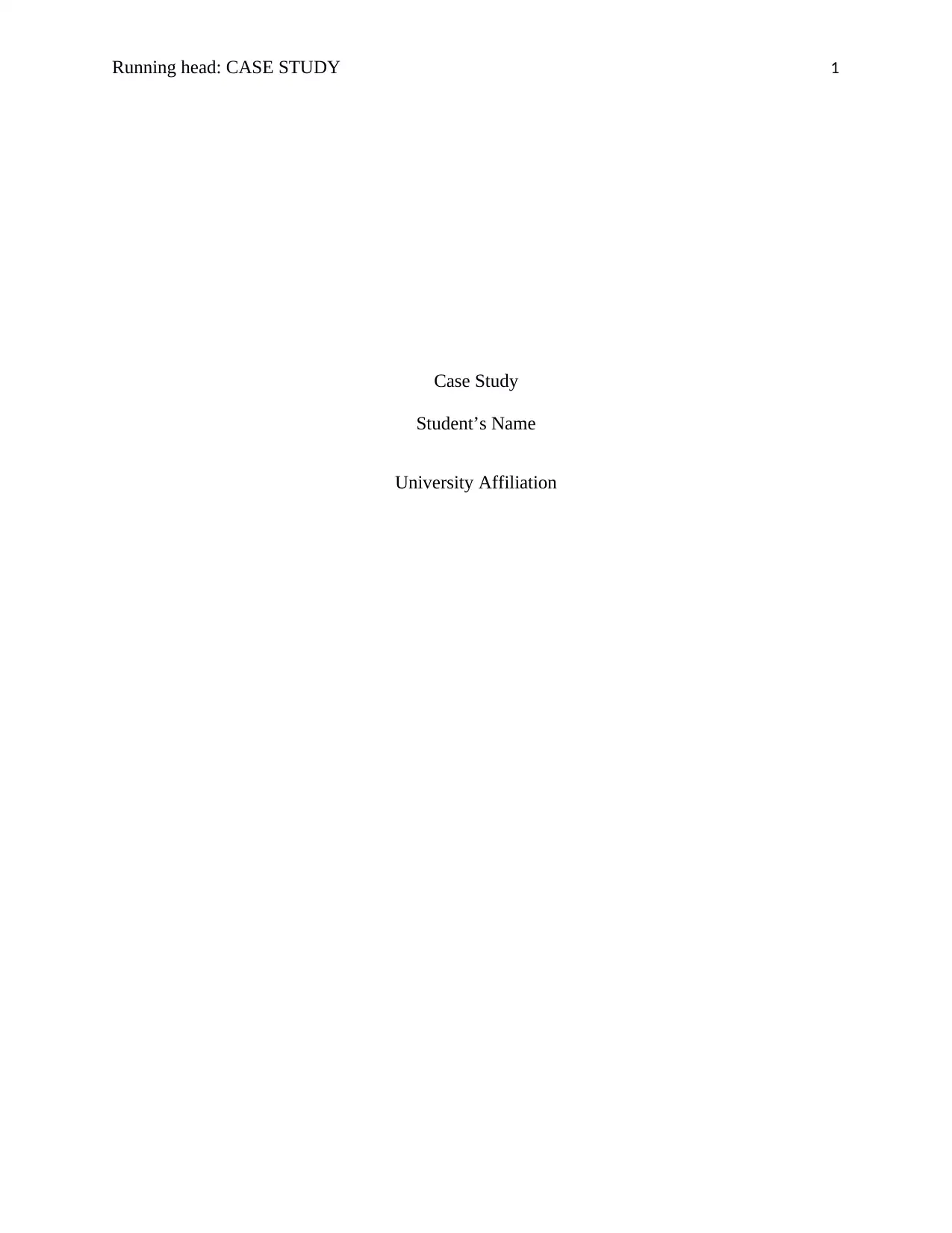
Running head: CASE STUDY 1
Case Study
Student’s Name
University Affiliation
Case Study
Student’s Name
University Affiliation
Paraphrase This Document
Need a fresh take? Get an instant paraphrase of this document with our AI Paraphraser
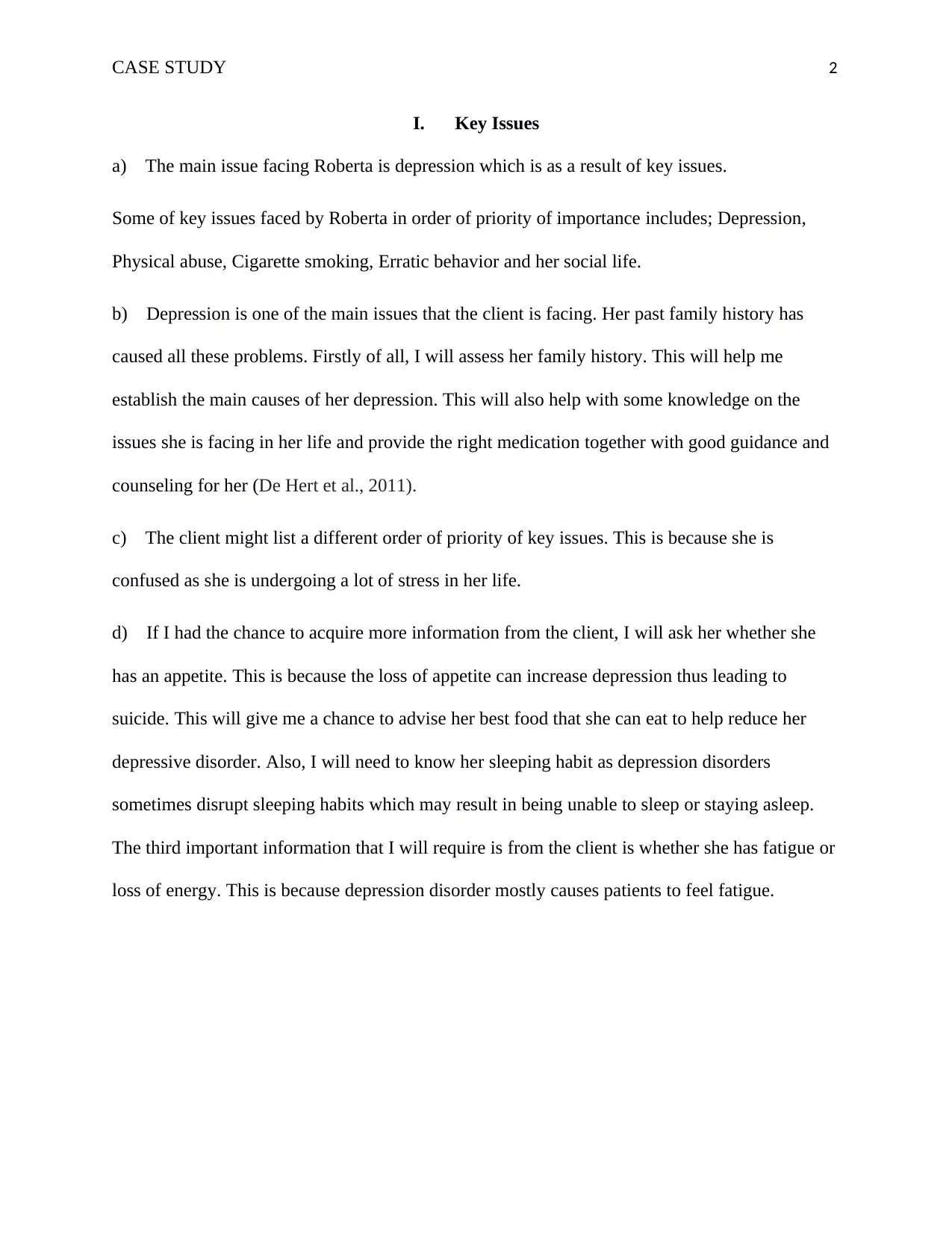
CASE STUDY 2
I. Key Issues
a) The main issue facing Roberta is depression which is as a result of key issues.
Some of key issues faced by Roberta in order of priority of importance includes; Depression,
Physical abuse, Cigarette smoking, Erratic behavior and her social life.
b) Depression is one of the main issues that the client is facing. Her past family history has
caused all these problems. Firstly of all, I will assess her family history. This will help me
establish the main causes of her depression. This will also help with some knowledge on the
issues she is facing in her life and provide the right medication together with good guidance and
counseling for her (De Hert et al., 2011).
c) The client might list a different order of priority of key issues. This is because she is
confused as she is undergoing a lot of stress in her life.
d) If I had the chance to acquire more information from the client, I will ask her whether she
has an appetite. This is because the loss of appetite can increase depression thus leading to
suicide. This will give me a chance to advise her best food that she can eat to help reduce her
depressive disorder. Also, I will need to know her sleeping habit as depression disorders
sometimes disrupt sleeping habits which may result in being unable to sleep or staying asleep.
The third important information that I will require is from the client is whether she has fatigue or
loss of energy. This is because depression disorder mostly causes patients to feel fatigue.
I. Key Issues
a) The main issue facing Roberta is depression which is as a result of key issues.
Some of key issues faced by Roberta in order of priority of importance includes; Depression,
Physical abuse, Cigarette smoking, Erratic behavior and her social life.
b) Depression is one of the main issues that the client is facing. Her past family history has
caused all these problems. Firstly of all, I will assess her family history. This will help me
establish the main causes of her depression. This will also help with some knowledge on the
issues she is facing in her life and provide the right medication together with good guidance and
counseling for her (De Hert et al., 2011).
c) The client might list a different order of priority of key issues. This is because she is
confused as she is undergoing a lot of stress in her life.
d) If I had the chance to acquire more information from the client, I will ask her whether she
has an appetite. This is because the loss of appetite can increase depression thus leading to
suicide. This will give me a chance to advise her best food that she can eat to help reduce her
depressive disorder. Also, I will need to know her sleeping habit as depression disorders
sometimes disrupt sleeping habits which may result in being unable to sleep or staying asleep.
The third important information that I will require is from the client is whether she has fatigue or
loss of energy. This is because depression disorder mostly causes patients to feel fatigue.
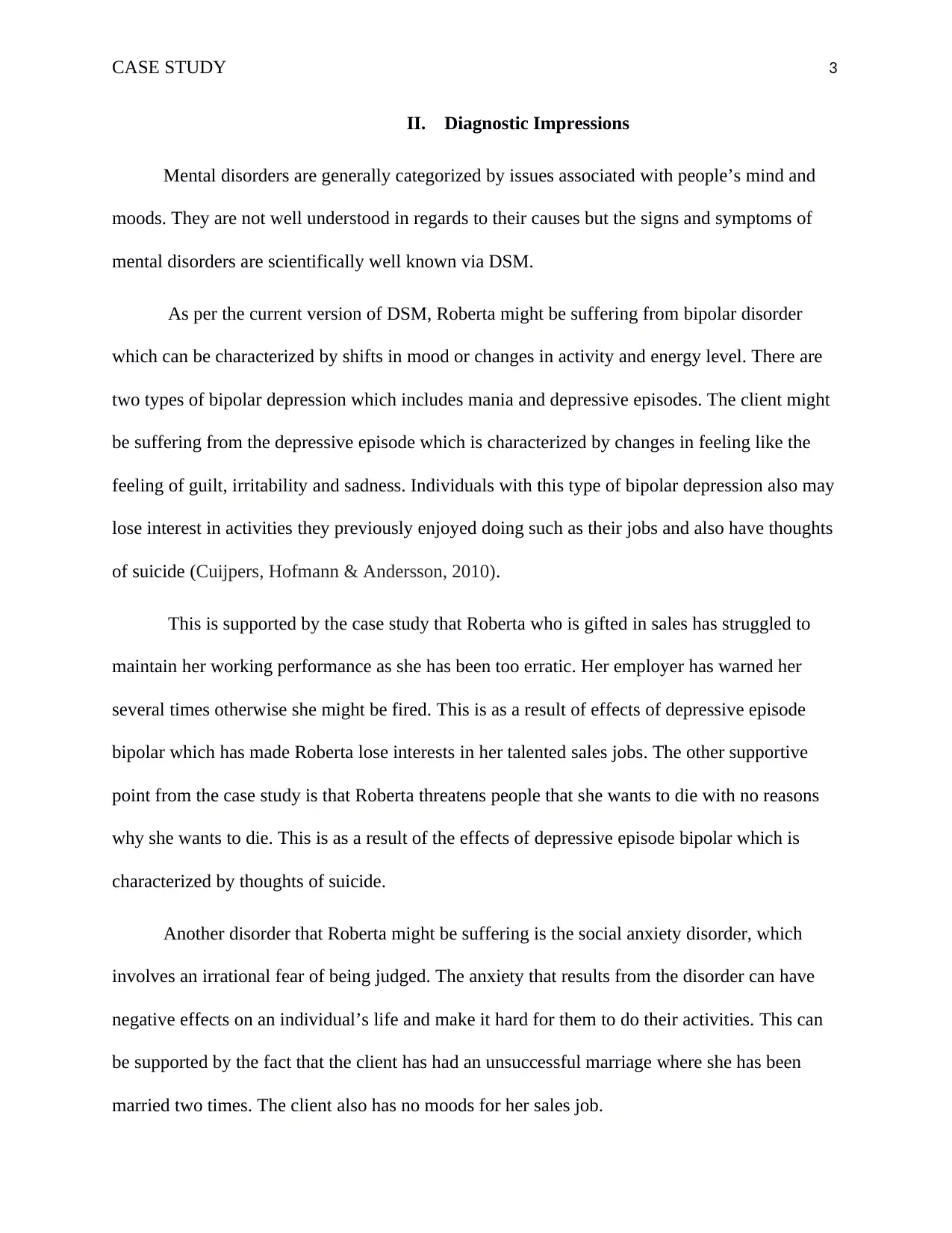
CASE STUDY 3
II. Diagnostic Impressions
Mental disorders are generally categorized by issues associated with people’s mind and
moods. They are not well understood in regards to their causes but the signs and symptoms of
mental disorders are scientifically well known via DSM.
As per the current version of DSM, Roberta might be suffering from bipolar disorder
which can be characterized by shifts in mood or changes in activity and energy level. There are
two types of bipolar depression which includes mania and depressive episodes. The client might
be suffering from the depressive episode which is characterized by changes in feeling like the
feeling of guilt, irritability and sadness. Individuals with this type of bipolar depression also may
lose interest in activities they previously enjoyed doing such as their jobs and also have thoughts
of suicide (Cuijpers, Hofmann & Andersson, 2010).
This is supported by the case study that Roberta who is gifted in sales has struggled to
maintain her working performance as she has been too erratic. Her employer has warned her
several times otherwise she might be fired. This is as a result of effects of depressive episode
bipolar which has made Roberta lose interests in her talented sales jobs. The other supportive
point from the case study is that Roberta threatens people that she wants to die with no reasons
why she wants to die. This is as a result of the effects of depressive episode bipolar which is
characterized by thoughts of suicide.
Another disorder that Roberta might be suffering is the social anxiety disorder, which
involves an irrational fear of being judged. The anxiety that results from the disorder can have
negative effects on an individual’s life and make it hard for them to do their activities. This can
be supported by the fact that the client has had an unsuccessful marriage where she has been
married two times. The client also has no moods for her sales job.
II. Diagnostic Impressions
Mental disorders are generally categorized by issues associated with people’s mind and
moods. They are not well understood in regards to their causes but the signs and symptoms of
mental disorders are scientifically well known via DSM.
As per the current version of DSM, Roberta might be suffering from bipolar disorder
which can be characterized by shifts in mood or changes in activity and energy level. There are
two types of bipolar depression which includes mania and depressive episodes. The client might
be suffering from the depressive episode which is characterized by changes in feeling like the
feeling of guilt, irritability and sadness. Individuals with this type of bipolar depression also may
lose interest in activities they previously enjoyed doing such as their jobs and also have thoughts
of suicide (Cuijpers, Hofmann & Andersson, 2010).
This is supported by the case study that Roberta who is gifted in sales has struggled to
maintain her working performance as she has been too erratic. Her employer has warned her
several times otherwise she might be fired. This is as a result of effects of depressive episode
bipolar which has made Roberta lose interests in her talented sales jobs. The other supportive
point from the case study is that Roberta threatens people that she wants to die with no reasons
why she wants to die. This is as a result of the effects of depressive episode bipolar which is
characterized by thoughts of suicide.
Another disorder that Roberta might be suffering is the social anxiety disorder, which
involves an irrational fear of being judged. The anxiety that results from the disorder can have
negative effects on an individual’s life and make it hard for them to do their activities. This can
be supported by the fact that the client has had an unsuccessful marriage where she has been
married two times. The client also has no moods for her sales job.
⊘ This is a preview!⊘
Do you want full access?
Subscribe today to unlock all pages.

Trusted by 1+ million students worldwide
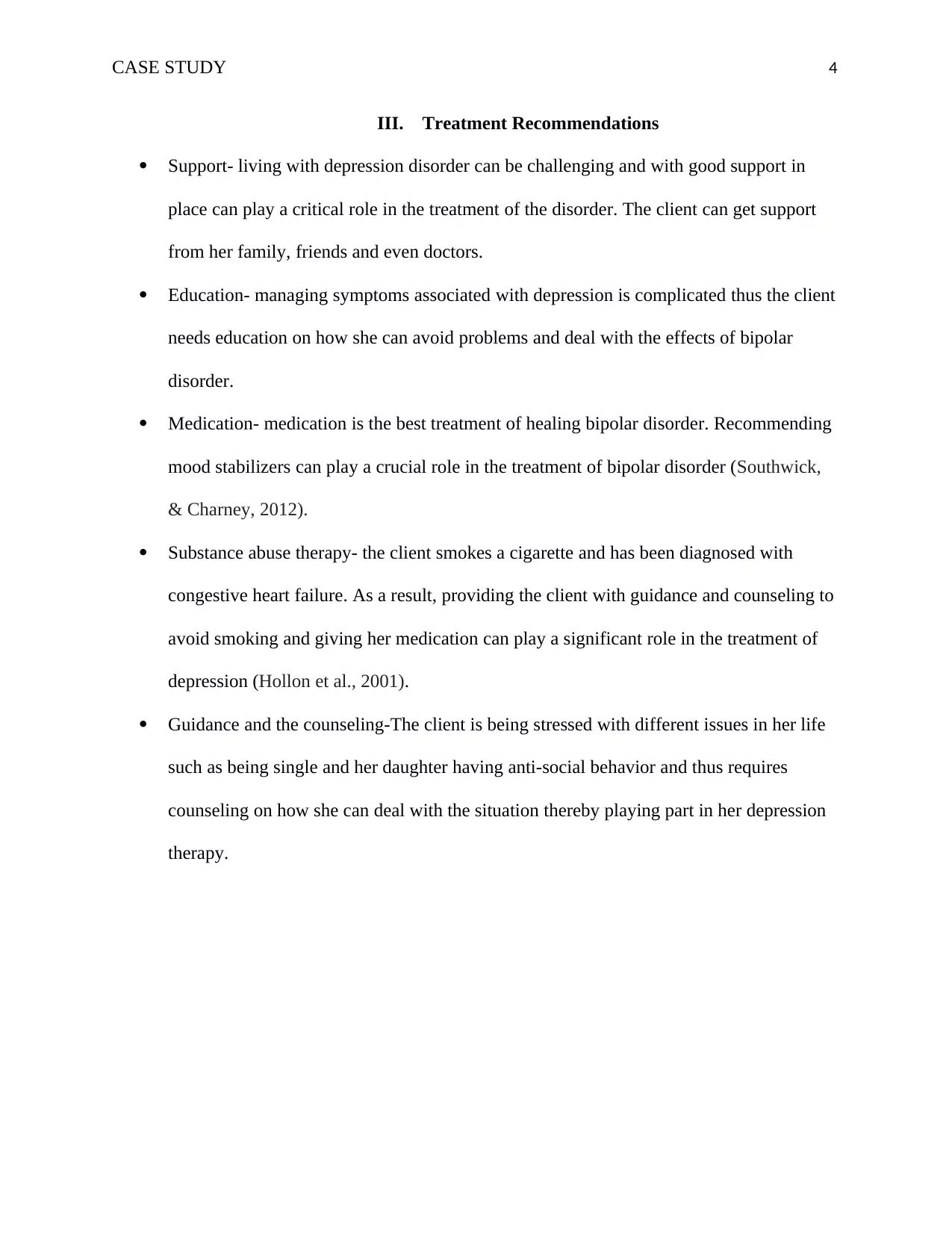
CASE STUDY 4
III. Treatment Recommendations
Support- living with depression disorder can be challenging and with good support in
place can play a critical role in the treatment of the disorder. The client can get support
from her family, friends and even doctors.
Education- managing symptoms associated with depression is complicated thus the client
needs education on how she can avoid problems and deal with the effects of bipolar
disorder.
Medication- medication is the best treatment of healing bipolar disorder. Recommending
mood stabilizers can play a crucial role in the treatment of bipolar disorder (Southwick,
& Charney, 2012).
Substance abuse therapy- the client smokes a cigarette and has been diagnosed with
congestive heart failure. As a result, providing the client with guidance and counseling to
avoid smoking and giving her medication can play a significant role in the treatment of
depression (Hollon et al., 2001).
Guidance and the counseling-The client is being stressed with different issues in her life
such as being single and her daughter having anti-social behavior and thus requires
counseling on how she can deal with the situation thereby playing part in her depression
therapy.
III. Treatment Recommendations
Support- living with depression disorder can be challenging and with good support in
place can play a critical role in the treatment of the disorder. The client can get support
from her family, friends and even doctors.
Education- managing symptoms associated with depression is complicated thus the client
needs education on how she can avoid problems and deal with the effects of bipolar
disorder.
Medication- medication is the best treatment of healing bipolar disorder. Recommending
mood stabilizers can play a crucial role in the treatment of bipolar disorder (Southwick,
& Charney, 2012).
Substance abuse therapy- the client smokes a cigarette and has been diagnosed with
congestive heart failure. As a result, providing the client with guidance and counseling to
avoid smoking and giving her medication can play a significant role in the treatment of
depression (Hollon et al., 2001).
Guidance and the counseling-The client is being stressed with different issues in her life
such as being single and her daughter having anti-social behavior and thus requires
counseling on how she can deal with the situation thereby playing part in her depression
therapy.
Paraphrase This Document
Need a fresh take? Get an instant paraphrase of this document with our AI Paraphraser
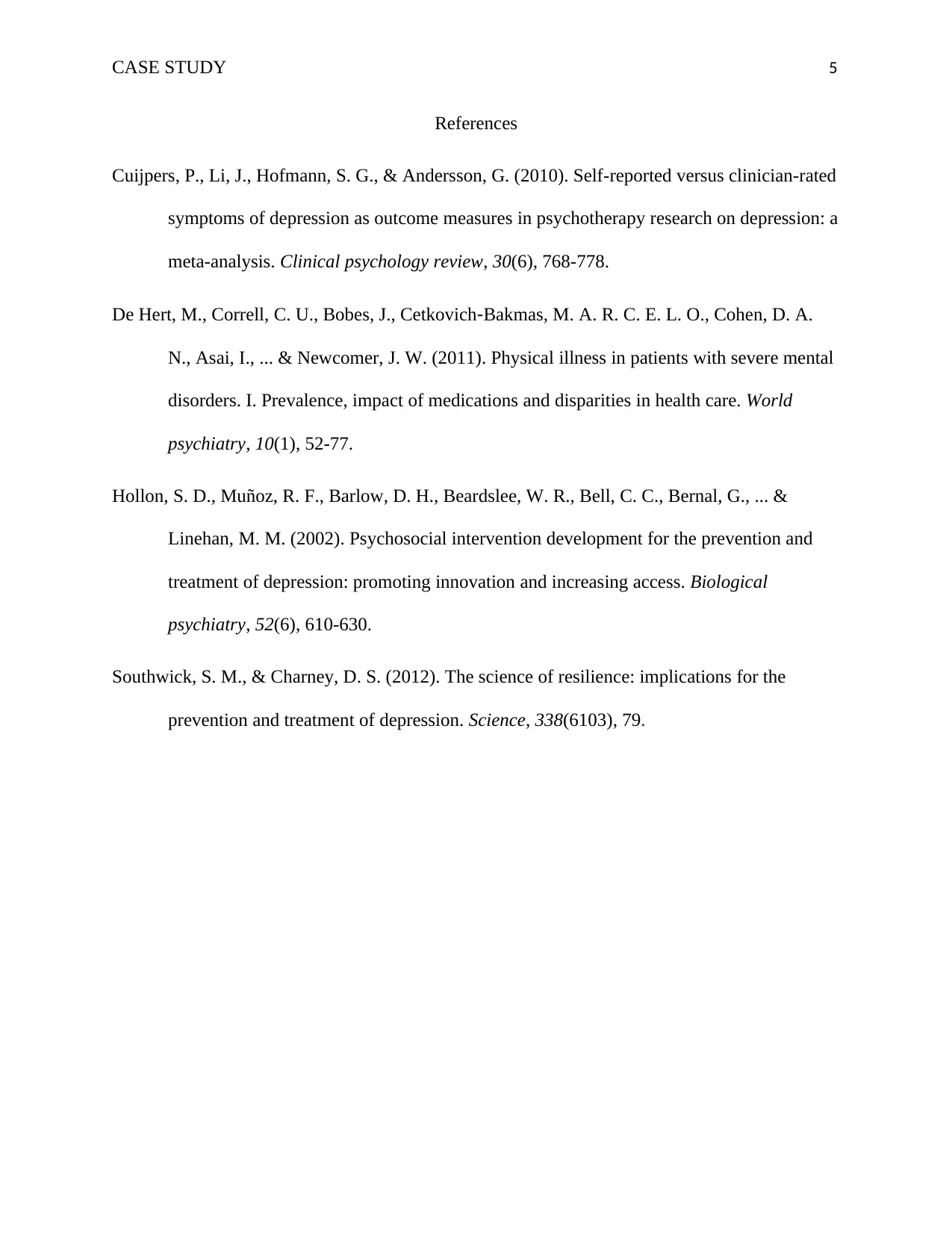
CASE STUDY 5
References
Cuijpers, P., Li, J., Hofmann, S. G., & Andersson, G. (2010). Self-reported versus clinician-rated
symptoms of depression as outcome measures in psychotherapy research on depression: a
meta-analysis. Clinical psychology review, 30(6), 768-778.
De Hert, M., Correll, C. U., Bobes, J., Cetkovich‐Bakmas, M. A. R. C. E. L. O., Cohen, D. A.
N., Asai, I., ... & Newcomer, J. W. (2011). Physical illness in patients with severe mental
disorders. I. Prevalence, impact of medications and disparities in health care. World
psychiatry, 10(1), 52-77.
Hollon, S. D., Muñoz, R. F., Barlow, D. H., Beardslee, W. R., Bell, C. C., Bernal, G., ... &
Linehan, M. M. (2002). Psychosocial intervention development for the prevention and
treatment of depression: promoting innovation and increasing access. Biological
psychiatry, 52(6), 610-630.
Southwick, S. M., & Charney, D. S. (2012). The science of resilience: implications for the
prevention and treatment of depression. Science, 338(6103), 79.
References
Cuijpers, P., Li, J., Hofmann, S. G., & Andersson, G. (2010). Self-reported versus clinician-rated
symptoms of depression as outcome measures in psychotherapy research on depression: a
meta-analysis. Clinical psychology review, 30(6), 768-778.
De Hert, M., Correll, C. U., Bobes, J., Cetkovich‐Bakmas, M. A. R. C. E. L. O., Cohen, D. A.
N., Asai, I., ... & Newcomer, J. W. (2011). Physical illness in patients with severe mental
disorders. I. Prevalence, impact of medications and disparities in health care. World
psychiatry, 10(1), 52-77.
Hollon, S. D., Muñoz, R. F., Barlow, D. H., Beardslee, W. R., Bell, C. C., Bernal, G., ... &
Linehan, M. M. (2002). Psychosocial intervention development for the prevention and
treatment of depression: promoting innovation and increasing access. Biological
psychiatry, 52(6), 610-630.
Southwick, S. M., & Charney, D. S. (2012). The science of resilience: implications for the
prevention and treatment of depression. Science, 338(6103), 79.
1 out of 5
Related Documents
Your All-in-One AI-Powered Toolkit for Academic Success.
+13062052269
info@desklib.com
Available 24*7 on WhatsApp / Email
![[object Object]](/_next/static/media/star-bottom.7253800d.svg)
Unlock your academic potential
Copyright © 2020–2026 A2Z Services. All Rights Reserved. Developed and managed by ZUCOL.





